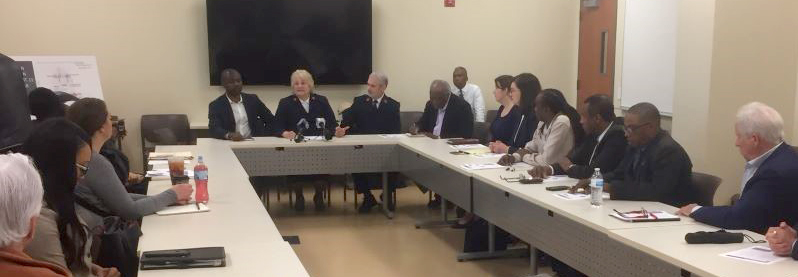Salvation Army Hosts Emergency Meeting After Rash of Overdoses on West Side

More than two dozen community stakeholders gathered at the Salvation Army Freedom Center in West Humboldt Park on Monday for an emergency meeting on the heroin epidemic.
Congressman Danny Davis (D-7th Dist.) and State Representative LaShawn Ford (D-Chicago) requested the meeting in response to a recent rash of overdoses on the west side. Alderman Walter Burnett (27TH) also attended.
“We believe with the right help, together with the people in this room, we can figure out how to change lives,” said Major Nancy Powers, Director of the Salvation Army Harbor Light Center.
“There is an absolute crisis,” Davis said. “The biggest generator is poverty. Unless we have a comprehensive approach to dealing with it, the problem continues.”
A number of organizations attended the meeting and shared ideas, including After School Matters, Chicago Recovery Alliance, Fathers Who Care, the Chicago Department of Public Health, the Illinois Department of Human Services, and the assistant state’s attorney.
A handful of people who live in West Humboldt Park also attended, including Sandra Brinson.
“How do you attack the problem for people who do not want help?” Brinson asked.
Ford called for the creation of a campaign to alert families that Narcan is available. Narcan, the brand name for naloxone, is administered to rapidly reverse the effects of an opioid overdose.
Major Powers recommended a Narcan giveaway day at the Freedom Center, tentatively planned for July 27.
But, Major Powers also questioned a decline in state funding. She said funding from the Division of Substance Use Prevention and Recovery, or SUPR, is down from $1 million to $200,000 in a few years’ time. She added that a client entering inpatient treatment under SUPR is pre-authorized for 15 days, but insurance only pre-authorizes for three days.
Richard Vargas, director of community social services for The Salvation Army, urged the group to think about all of the roadblocks that can prevent people from entering treatment. He said many of the city’s homeless do not have any form of identification.
“I can understand that we need insurance, we need identification,” said Richard Vargas, The Salvation Army’s director of community social services. “But, if it’s placing that value over an individual that really needs that help, then I think that’s creating those barriers that we need to overcome.”
Ford said he plans to a request a large sum of money in the next state budget to help curb the heroin epidemic on the west side.
The Fight is Now. Join the Fight for Good:
